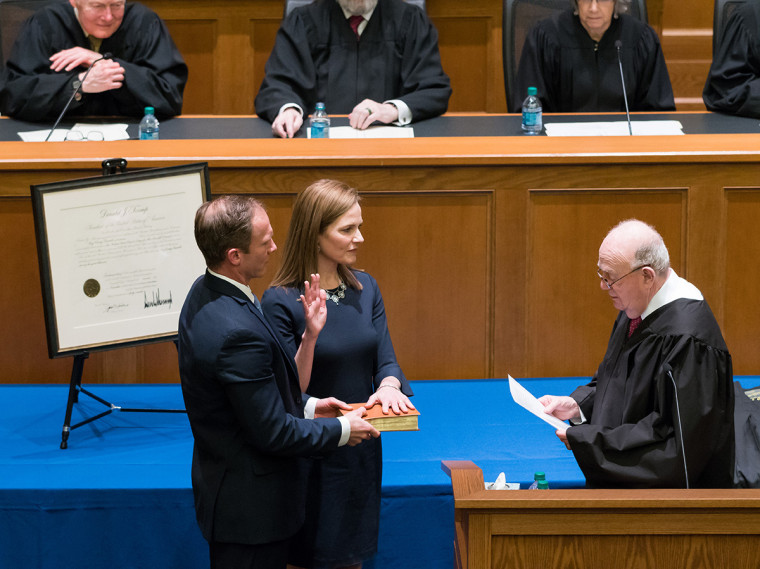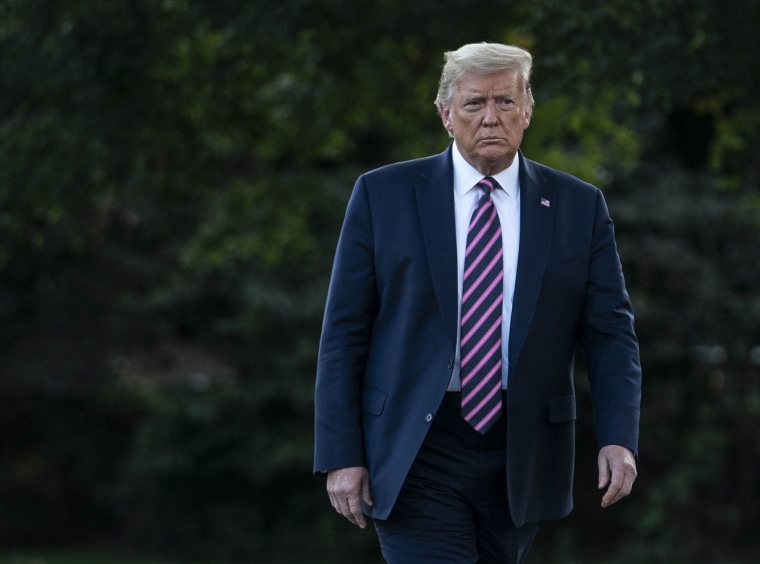WASHINGTON — The sudden vacancy on the Supreme Court has both energized and divided white evangelicals — some of President Donald Trump's most loyal supporters — who have been making different cases to the White House about the type of nominee he should put forward and the timing for Senate confirmation.
The disagreement has come down to a fight over two candidates who are federal appeals court judges — Amy Coney Barrett and Barbara Lagoa.
Trump has heard from evangelical leaders who argue that his religious supporters might be less enthusiastic about a nominee like Lagoa — who they say doesn't have enough of a paper trail to demonstrate conservative credentials — but who say they'll turn out to vote for the president's choice anyway. Others have told Trump that they'll accept only a nominee like Barrett, who they say has a clear conservative and anti-abortion record, and that without such a pick he'll lose critical support.
"Not all on the list are acceptable, and that's being communicated," said Tony Perkins, president of the Family Research Council, who has told the White House that nominating Lagoa wouldn't go over well with him and other evangelicals.
While some of the president's allies have pointed to the Senate's bipartisan 80-15 vote last year to confirm Lagoa to the 11th U.S. Circuit Court of Appeals as an advantage, Perkins said that's actually a significant drawback, because it shows she's not hard-line enough.
"In this Senate, in this environment, that itself raises questions," he said. By contrast, Barrett was confirmed to the 4th Circuit Court on a party-line vote of 55-43 in 2017.
Trump has said that he'll announce his nominee Saturday and that he wants the Senate to confirm his pick before the Nov. 3 election.
Robert Jeffress, senior pastor at First Baptist Church in Dallas, expressed concern about holding a confirmation vote before Election Day.
"You never want to give a child their dessert before they eat their meat or vegetables. So I've had a concern that it could possibly spoil the appetite of conservatives," Jeffress said. But first, he said, the president has to navigate the divergent demands from evangelicals.
"Some want an absolute purist like Judge Barrett, who they think can be counted on, versus a conservative who they can't fully get a read on," he said.
Trump can't afford to alienate white evangelical voters as he faces re-election.
Four states that were key to his victory in 2016 had large concentrations of white Christians (encompassing evangelical Protestants, mainline Protestants and Catholics): Pennsylvania (57 percent), Wisconsin (63 percent), Ohio (58 percent) and Iowa (64 percent), according to polling from the Public Religion Research Institute.
In the battleground state of North Carolina, where both Trump and Democratic nominee Joe Biden campaigned this week, 60 percent of white voters unaffiliated with a party identify as evangelical, according to an Elon University Poll this year.
A series of 2020 polls have shown Trump's backing among evangelicals slipping, despite his aggressive efforts since he took office to keep their support.
Trump's support among white evangelical voters this summer — 69 percent — lagged behind the support he enjoyed four years ago — 78 percent — according to a survey conducted by the American Enterprise Institute, or AEI, a conservative think tank based in Washington. A Fox News poll over the summer also found that Trump was underperforming among white evangelicals.
Vote Common Good, a Christian group that opposes Trump, released a survey this month of voters in five battleground states — Florida, Pennsylvania, Wisconsin, North Carolina and Michigan — that found an 11 percent swing in evangelical and Catholic voters from Trump to Biden. The survey also found that 8 percent of evangelicals who didn't vote for Trump or Hillary Clinton in 2016 support Biden.
The shift, said Doug Pagitt, who founded the group, is driven by their views of Trump's conduct, not his policies, so he said a Supreme Court fight is unlikely to move these voters.
"I haven't heard anyone say, 'I wasn't going to vote in this presidential election, but now that Donald Trump is going to appoint a Supreme Court nominee 40 days before an election, now I'm going to vote,'" Pagitt said.
Trump's drop in support among evangelicals has been in part because of disapproval of his handling of the coronavirus pandemic, which has caused more than 200,000 deaths. And it mirrors a broader gender gap in his support, according to the AEI survey of registered voters, which found that 63 percent of white evangelical women are backing Trump, compared to 76 percent of white evangelical men.
Trump's promise to fill the seat vacated by the death of Justice Ruth Bader Ginsburg with a woman is a clear attempt to appeal to women voters. But the effort is being challenged by other religious groups that are reaching out to voters in battleground states to make the case that the women on the president's shortlist for the court would pose a risk to abortion rights and access to health care.
"For our women, including pro-life and pro-choice religious women, they are concerned about the Affordable Care Act," said Jennifer Butler, the executive director of Faith in Public Life, which advocates for a coalition of progressive religious voters. "We're awake to the fact that what conservatives want to do with the Supreme Court pick is roll back civil rights, our economic power as women and our health care access. That will only hurt women and hurt families."

The president's political allies broadly hope the unexpected opportunity for him to nominate a third Supreme Court justice can shore up evangelical voters and win back disaffected women.
"This nomination fight could be the turn-out-the-vote key to the entire election for Trump," said evangelical activist Joel Rosenberg, editor of All Israel News. "The Trump base is very worried, and this nomination is going to remind them: If you sit home and let your friends sit home, everything you believe in is going to be washed away."
Ken Farnaso, a spokesman for the Trump campaign, noted the importance evangelicals have long put on Supreme Court nominees.
"Historically, the evangelical community has always seen the Supreme Court as a top-three issue during presidential elections," Farnaso said in a statement. "President Trump will be nominating a constitutional conservative and extremely qualified woman to the bench. Evangelicals, and most people of faith, value life, freedom, and limited government, and we are looking forward to introducing the president's nominee to the American people when he announces the nomination on Saturday."
But to the extent that a Supreme Court fight motivates voters to back Trump at all, the nominee he chooses could be decisive.
Josh Hammer, a lawyer at First Liberty Institute, a legal group that identifies as defending religious freedom, said a nominee should have a clear record of opposing Roe v. Wade. He said religious conservatives are fearful that a nominee would follow the trajectory of David Souter, a justice appointed by President George H.W. Bush, who reliably sided with the more liberal-leaning justices toward the end of his tenure.
Lagoa, he said, has "zero record whatsoever on Roe."
Sen. Josh Hawley, R-Mo., echoed that view, expressing concern that Republicans have appointed the majority of Supreme Court justices and yet "many, many of those turned out not to be very conservative, because people didn't do their due diligence and bought into the 'trust us' mentality."
The president, whose campaign launched the Evangelicals for Trump coalition in January, has been making political calculations as he navigates one of his final transactions with his most ardent supporters before Election Day.
Trump has talked about Lagoa's potential importance to his political goals, noting that she's from the critical battleground state of Florida and pointing to her Cuban American roots. And he has met with Barrett at the urging of religious conservatives.
"This Supreme Court vacancy is a stark reminder of what this election is all about, and I think it may help evangelicals who may be on the fence remember why they voted for him in 2016," Jeffress said. "The bottom line is we did not vote for this president for his piety but for his public policies."
Rosenberg said evangelical voters have tried to overlook some of his rhetoric or actions because, "overall, the agenda has been so positive."
"Many evangelicals are frustrated, discouraged by things the president says, tweets," Rosenberg said. "Watching the president in motion sometimes is like watching sausage get made. You really don't want to watch the process. It's not pleasant. However, if you sit down and have a nice sausage as a meal, it's a good meal. You just don't want to see it get made."
At first glance, it may seem like an odd pairing — a president with no deep allegiance to faith and a profoundly religious community. But it has been a productive match.
Evangelical leaders argue that Trump has more than delivered on their agenda — from signing executive orders aimed at championing their causes to moving the U.S. Embassy in Israel to Jerusalem to nominating hundreds of conservative judges.
Download the NBC News app for breaking news and politics
But the president's first two Supreme Court nominees have gotten mixed reviews from religious conservatives who have felt that they didn't deliver on some key decisions.
For Perkins, the bigger the fight this time, the bigger the motivation for Trump's voters to turn out.
"If the president picks one you're going to have to fight for, that actually raises the intensity," Perkins said. "If you pick someone who is a question mark, you don't get that intensity. ... You get indifference."



